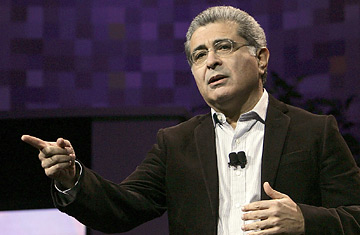
Terry Semel of Yahoo!.
It was certainly fun while it lasted. Terry Semel's six-year ride atop Yahoo! juiced up the company's annual revenue nine-fold and added $30 billion to its net worth. As Yahoo rose under his watch, AOL sank. But when you compete against the godzilla that is Google, even modest slip-ups can cost you a job. A sliding stock doesn't sit well, and second place in the Web world isn't good enough.
So Semel stepped down as CEO this week in favor of co-founder Jerry Yang, a Stanford wonder kid just like those Google guys who burst Yahoo's bubble. Yang is likely to take a back-to-basics approach to Yahoo, focusing on streamlining the company's many ventures to squeeze more revenue out of the company's new Panama advertising system, a revamped ad platform created to compete more aggressively against Google. "Yang's strengths are sentimental, technical, and basic," says Jordan Rohan, technology analyst with RBC Capital Markets.
Because he founded the company with energy and enthusiasm, Yang may be able to help revive flagging employee morale, which has led to a number of senior-level departures this year. "The company needs internal excitement," says Ned May, lead analyst for Outsell, a California-based research and consulting firm. But analysts point out that Yang lacks the trial-by-fire management experience other top CEOs could have brought to Yahoo.
"There's probably no better person than a founder to rescue a troubled company," says May, "but there may also be no better person to drive it into the ground. History is going to look favorably on Steve Jobs, but there are lots of unwritten stories where founders weren't successful." David Smith, technology analyst at Gartner, says Yang may have too much influence for Yahoo's own good. "Founders have a special place in every company and tend to be listened to longer than they should," he says.
Hired guns like Semel, on the other hand, aren't usually cut as much slack. Semel tried to inject Yahoo! with some Hollywood flair, but it was ultimately his downfall. In 2004, he drafted former ABC mogul Lloyd Braun to run Yahoo!'s media and entertainment division. That multiheaded beast included Yahoo!'s movies, TV, entertainment, music, games, finance, news and weather, sports, health and kids businesses. If that sounds like a lot under one departmental roof, it was. Braun eventually left and the division was restructured.
Still, not all of Yahoo's efforts fared as poorly as Semel's entertainment strategy. Its photo, email, travel and mobile offerings have proved popular and have been successful audience-builders. But Yahoo's broad array of assets have proved difficult to manage, prompting the so-called Peanut Butter Manifesto last year, in which senior VP Brad Garlinghouse argued that Yahoo! was spreading itself too thin. And now that Yahoo has created a precedent in shedding Yahoo! Photos in favor of Flickr, it may cut down further on other businesses to focus on its core offerings.
In an interview with TIME last January, Flickr co-founder Stewart Butterfield said that there was, for a long time, a lot of uncertainty within Yahoo about whether it was a tech company or a media company. He noted that before Semel joined Yahoo, there had been some drifting and ambiguity about its mission. Recently, though, Butterfield said, Semel had focused Yahoo on being a communications and communities company. That's where it remains today, according to the company's mission statement, and that's where Yang and Decker are likely to focus. "What he missed was the emergence of Google and the strength a single company could gain with search," says May of Semel. "but he wasn't alone in missing that. And Yahoo remains the second largest company in this sector."
One approach Yang may take, alongside Sue Decker, who joins him as second in command, is to push for Yahoo to partner with Microsoft or a leading social networking site like MySpace to help spark some new momentum. "He can be trusted to find Yahoo a great partner or acquirer to help the company get out of its present predicament," says Rohan.
Unable to acquire Facebook last year for a billion dollars, the company may look to a deal with Microsoft as a way of gaining access to a new array of partners, including both cell phone and PC manufacturers and wireless carriers. "Microsoft and Yahoo have a long history of being partners and they're likely to get closer," says Smith. "We wouldn't be surprised to see a joint venture emerge."
